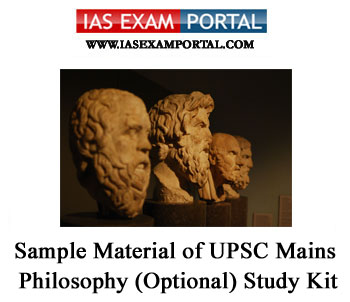(HOT) UPSC Current Affairs 2025 PDF
NEW! The Gist (NOV-2025) | E-BOOKS
(Sample Material) UPSC Mains Philosophy (Optional) Study Kit "Indian Philosophy (Buddhism)"

Sample Material of UPSC Mains Philosophy (Optional) Study Kit
Topic: Indian Philosophy (Buddhism)
Gautama Buddha (563 B.C.– 483 B.C.) was the founder of Buddhism.
Buddhism gives importance to the impermanence of existence and the sufferings associated with it. All existence, animate or animate, being in a state of flux, undergoes changes incessantly. Nothing is permanent. Existence is the source of all suffering. Life is suffering. The impermanence itself is the greatest dukha. Ignorance leads to sufferings and bondage. Karma is born out of ignorance. Karmic impressions are carried from this birth to the next birth. This means that the present conditions of life are the results of the past karma. Every thought, word or action of the past existence has a bearing on the present existence.
The most ‘striking’ feature of Buddhism is the doctrine of non-self (Anatta). In a glaring and sharp contrast to the major philosophies, the Buddhism does not accept the permanent entity such as ‘soul’ or the ‘atman’. It maintains that there is no permanent and enduring entity in man. There is no distinct entity as the self or the soul. Buddhism advances the theory of Nirvana. Nirvana is a state of total freedom and no sufferings. With perfect knowledge, perfect peace and perfect wisdom, man is free from all bondage in a state of Nirvana.
Lord Buddha has presented four Noble Truths:
(1) Existence is invariably associated with suffering.
(2) Every suffering (dukha) has a cause.
(3) Suffering can be eliminated if the cause is eliminated.
(4) There is a path to Nirvana which puts an end to all sufferings.
Click Here for UPSC Mains Philosophy Study Material
The eight-fold path to Nirvana suggested by the Buddha is:
(1) Right views
(2) Right resolve
(3) Right speech
(4) Right conduct
(5) Right livelihood
(6) Right effort
(7) Right mindfulness
(8) Right concentration.
Buddhism is divided into two sects: Mahayana and Hinayana. Mahayana literature is written in Sanskrit and Hinayana literature is written in Pali.

